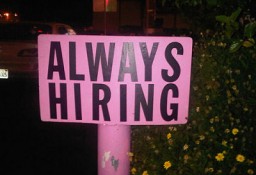All employers have a hiring agenda. They want individuals who can help them reach their corporate goals by overcoming the problems, challenges, pressures and issues that get in the way.
Future potential
Context or ‘culture’ is very important in hiring decisions. For example, the newspaper industry has collapsed and thrown thousands of journalists out of work as advertisers shift to online platforms…but many social media companies don’t hire newspaper journalists because they want people with a different mindset, or employees not conditioned by ‘old’ forms of publishing. These employers often start with young people who have basic technical skills and hire for future potential.
Such employers often profile their top 3-5 employees to identify their success factors, and then formulate interview questions to uncover those attributes because they are looking for certain traits, capabilities or values that match the culture of the company. This is especially true for the ‘disruptors’ that are creating new markets, such as Apple or Google, or companies eating into the market share of traditional sectors, the way Netflix is challenging broadasters or Amazon is replacing retailers.
Many of these ‘new’ economy employers focus on the role of their interviewers to ask questions that will uncover future potential to operate in emerging or creative industries requiring a higher level of cognitive tasks. They often use a rating system when interviewing candidates about their interests, values, and outside activities, more than their previous job experiences. They are often looking for signs of adaptability, flexibility and creativity because these jobs require individuals who can be trained to the shifting context they will be working in.
Past success
Most traditional employers use a behavioural-based methodology when interviewing candidates. This approach is based on the idea that the best predictor of future behavior is past behavior in similar circumstances, e.g. “tell me about a time when you had to….” These employers identify what competencies and behaviors are important in a job and then ask questions to see if the candidate has behaved in the desired way in the past.
This is especially true for roles that use metrics as measures of success–the kinds of problem, service, and incident management tasks that make up so many IT, customer service, social work, health, public administration jobs, including sales reps, tech troubleshooters, call center agents, case workers, nurses, border agents, or airline pilots. Often these tasks are routine, methodical, sometimes manual, and sometimes administrative. Employers of this type might give tests, call previous employers, and conduct behavioral-based interviews to get a clear picture of past behaviors beyond what candidates present on a resume. These employers focus on the role of the candidate in the interview.
What to do
When preparing the interviews, it is important to research the culture of a potential employer, to find out their approach to interviewing. Will they focus on past success or future potential?
It is also important for you as a candidate to communicate with clarity and confidence. This means you need to know the right questions to ask a potential employer in order to uncover their hiring agenda. You need to answer their questions with compelling stories that demonstrate specific ways that you can add value to their operations, whether they are looking for concrete examples from past experience or trying to uncover certain attributes.
Having the right strategy and tactics in place before an interview can help you win a job offer in a very competitive job market. Jobjoy provides a range of services to mine your story for the best material to present to potential employers.
If you are trying to make a career or job change, it is important to prepare for interviews accordingly.







